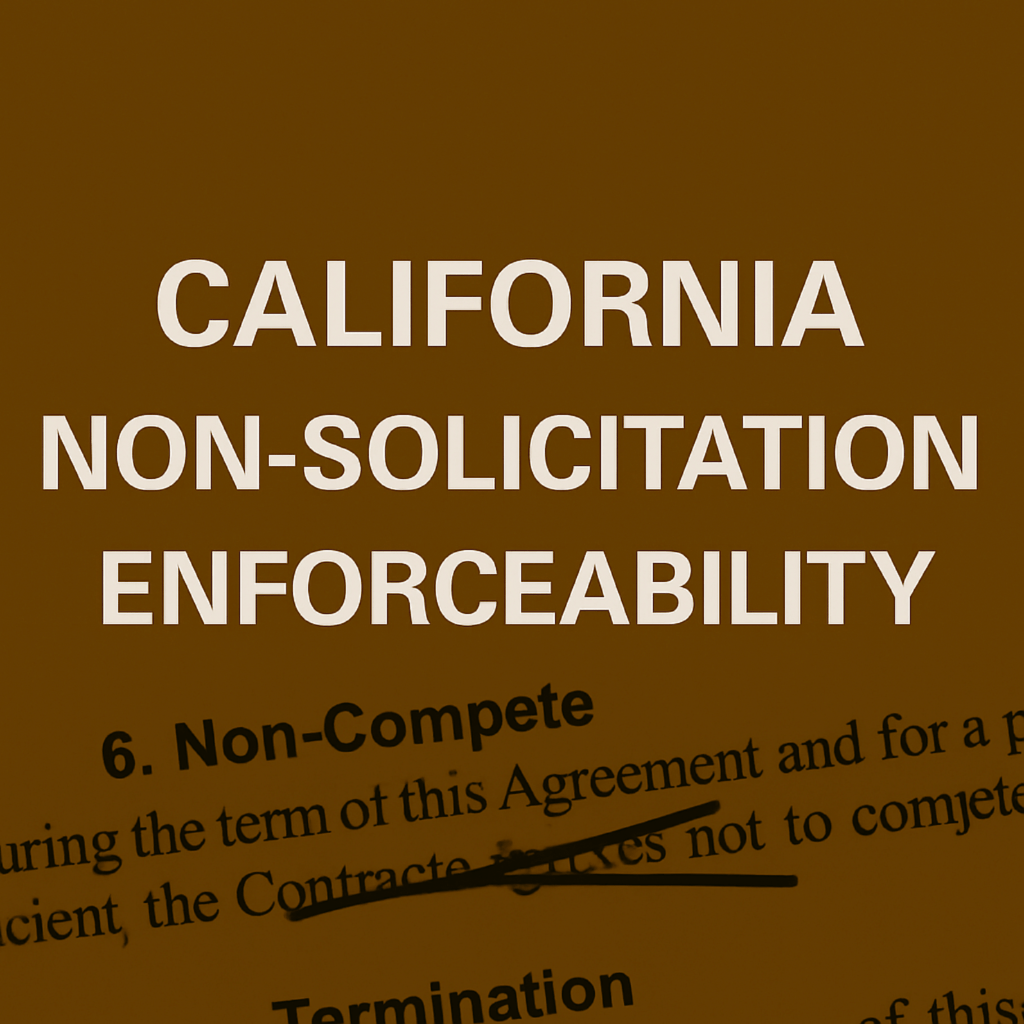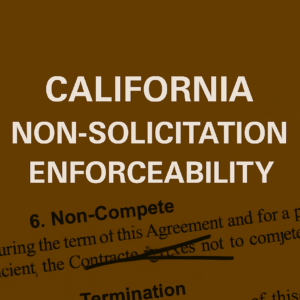In this article, L.A. Tech and Media Law Firm, a technology law firm in Los Angeles, explores the enforceability of non-solicitation clauses in independent contractor agreements under California law — what’s permitted, what’s not, and how startups can legally protect client and employee relationships without triggering unenforceable provisions.
What Is a Non-Solicitation Clause?
A non-solicitation clause is a contractual provision that prohibits one party — often an employee or independent contractor — from soliciting clients, customers, or other team members of a business after the contract ends. These clauses are commonly found in:
- Employment agreements
- Independent contractor agreements
- Founder agreements
- Consulting and agency contracts
They are designed to protect the company’s relationships and prevent unfair competition — particularly in high-value industries such as technology, software development, legal services, and marketing.
But in California, non-solicitation clauses are subject to strict scrutiny. They may be entirely unenforceable depending on how they’re drafted and enforced.
Are Non-Solicitation Clauses Enforceable in California?
In most cases, non-solicitation clauses are not enforceable under California law, particularly in the context of employment. This is due to California Business and Professions Code §16600, which states:
“Every contract by which anyone is restrained from engaging in a lawful profession, trade, or business of any kind is to that extent void.”
California courts have consistently interpreted this statute to prohibit non-compete and many non-solicitation clauses unless they fall under a statutory exception (such as the sale of a business).
Key Cases
- Edwards v. Arthur Andersen LLP (2008): The California Supreme Court held that even narrowly tailored non-solicitation clauses are generally void, rejecting prior lower court decisions that permitted “reasonable” limitations.
- The Retirement Group v. Galante (2009): While the court held that using trade secrets to solicit clients is not allowed, a standalone client non-solicitation clause still violates Section 16600 if not based on trade secret misappropriation.
How Does This Apply to Independent Contractors?
The ban on non-solicitation clauses applies equally to independent contractors — not just employees. California law does not distinguish between W-2 employees and 1099 contractors for purposes of Section 16600.
This is especially important for startups that:
- Hire developers, designers, marketers, or consultants on a contract basis
- Share proprietary information or client relationships during the engagement
- Want to prevent contractors from poaching clients or team members after the project ends
Unfortunately, simply calling someone an “independent contractor” doesn’t make a non-solicitation clause enforceable.
Can Startups Still Protect Themselves?
Yes — but startups must use alternative legal strategies that comply with California law.
Strategy 1: Use of Non-Disclosure Agreements (NDAs)
Startups can and should use NDAs or confidentiality agreements to:
- Define and protect proprietary information
- Limit disclosure and use of trade secrets
- Establish rights to injunctive relief and damages if misappropriation occurs
While NDAs don’t prohibit solicitation per se, they make it unlawful for a former contractor to use confidential client data to solicit business.
Strategy 2: Trade Secret Enforcement
Under the California Uniform Trade Secrets Act (CUTSA) and the federal Defend Trade Secrets Act (DTSA), a startup may sue a contractor who:
- Takes customer lists
- Downloads source code
- Uses pricing models or marketing data
- Leverages confidential systems for their own business gain
The key is proving the material is a “trade secret” and that misappropriation occurred. A generic “don’t solicit” clause won’t cut it.
Strategy 3: Contractual Duty of Loyalty (While Engaged)
While employed or actively contracted, California law does allow obligations of loyalty and duties not to compete or solicit. Startups should clearly define:
- Scope of permitted activities during the engagement
- Prohibition on diversion of business or clients
- No poaching of team members or contractors during term
But these restrictions must expire at the end of the engagement — or risk being void under Section 16600.
 How Should Startups Draft Contractor Agreements in California?
How Should Startups Draft Contractor Agreements in California?
A strong independent contractor agreement in California should avoid unenforceable non-solicitation language and instead focus on:
- Precise confidentiality provisions
- Intellectual property ownership clauses
- Narrow definitions of trade secrets and proprietary information
- Reasonable use restrictions during the term of engagement
- Remedies for breach tied to actual misappropriation, not mere solicitation
Avoid blanket statements like “Contractor shall not solicit any clients or employees of the Company for 2 years” — these are almost always invalid.
Are There Any Exceptions to California’s Ban?
Yes — but they are limited and rarely applicable to startup contractors:
- Sale of a Business Exception (§16601): If a person sells the goodwill of a business (e.g., founders sell their startup), they may agree not to compete or solicit for a limited time.
- Franchise Law Exceptions: Certain franchise agreements may include enforceable restrictive clauses, though they are scrutinized closely.
Startups that haven’t sold any part of their business cannot use these exceptions to enforce non-solicitation clauses against contractors.
What Happens If a Startup Tries to Enforce One Anyway?
Enforcing an unlawful non-solicitation clause can result in:
- A declaratory judgment that the clause is void
- A counterclaim for wrongful termination or unfair competition
- Exposure to attorneys’ fees if the contractor successfully challenges the agreement
- Reputational damage and mistrust among future hires or collaborators
That’s why proper legal consultation is essential when drafting contractor agreements in California.
Internal Links
For further reading, see:
Contract Attorney Protecting Your Startup
California law is clear: non-solicitation clauses are generally unenforceable in independent contractor agreements. However, this doesn’t mean startups are powerless. With strong NDAs, smart trade secret protection, and careful contract drafting, L.A. Tech and Media Law Firm helps tech founders navigate enforceability limits and build enforceable protections tailored to their business model.
David Nima Sharifi, Esq., founder of the firm, is a nationally recognized IP and technology attorney with decades of experience in M&A transactions, startup structuring, and high-stakes intellectual property protection, focused on digital assets and tech innovation. Featured in the Wall Street Journal and recognized among the Top 30 New Media and E-Commerce Attorneys by the Los Angeles Business Journal, David regularly advises founders, investors, and acquirers on the legal infrastructure of innovation. Schedule your confidential consultation now by visiting L.A. Tech and Media Law Firm or using our secure contact form.



